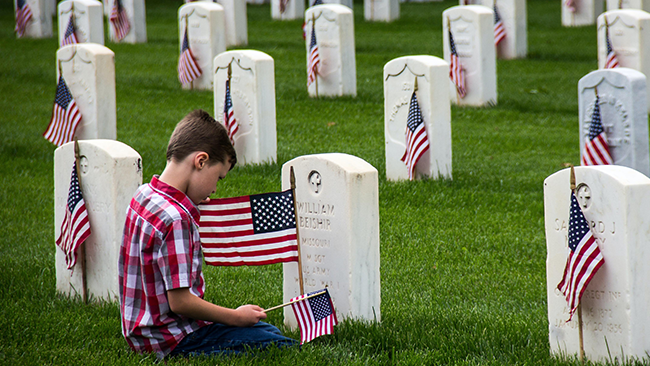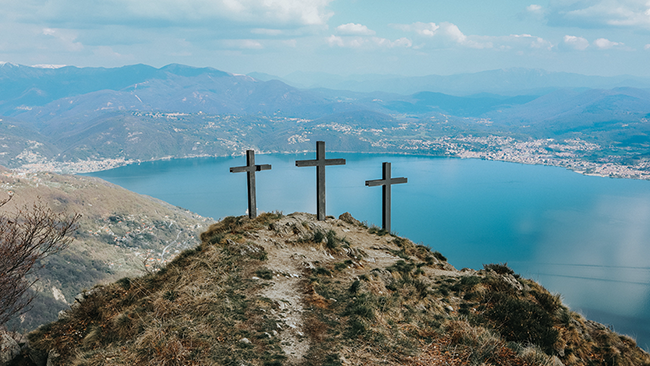On May 26, 1986, President Ronald Reagan shared these stories:
“Here in Arlington rests a sharecropper’s son who became a hero to a lonely people. Joe Louis came from nowhere, but he knew how to fight. And he galvanized a nation in the days after Pearl Harbor when he put on the uniform of his country and said, ‘I know we’ll win because we’re on God’s side.’
“Audie Murphy is here—Audie Murphy of the wild, wild courage. For what else would you call it when a man bounds to the top of a disabled tank, stops an enemy advance, saves lives, and rallies his men, and all of it single-handedly. When he radioed for artillery support and was asked how close the enemy was to his position, he said, “Wait a minute and I’ll let you speak to them.”
What a privilege to reside in a nation undeniably built upon Christian principles—the foundations of biblical liberty, individual responsibility, and the freedom to worship the true God. What a blessing to have a nation that has had a wealth of God-fearing, God-loving leaders in our heritage. What a gift to live our lives in a nation built upon the courageous sacrifice of so many who fought and died!
Today—Memorial Day—we remember. We thank God for the courage, sacrifice, and love of those who gave their lives so that we might live ours. “Greater love hath no man than this, that a man lay down his life for his friends.” (John 15:13)
This week, I took some time to read and view some of President Ronald Reagan’s Memorial Day Speeches. It was encouraging to be reminded of a time, in the not so distant past, when our presidents feared God, believed in prayer, and called our nation to the highest biblical ideals and values. It was a blessing to read his call to dependance upon “Almighty God.” It was also convicting that, in several speeches, he called for Memorial Day to be a day of prayer for all Americans.
May 21, 1987:
“Now, Therefore, I, Ronald Reagan, President of the United States of America, do hereby designate Memorial Day, Monday, May 25, 1987, as a day of prayer for permanent peace, and I designate the hour beginning in each locality at eleven o’clock in the morning of that day as a time to unite in prayer. I urge the press, radio, television, and all other information media to cooperate in this observance.”
With the advent of social networking, I wonder if perhaps many Christians have left off praying for our nation in exchange for bloviating streaming outrage. Have we forgotten the power of prayer and rather filled the time with ranting and raging over national decline and liberal shifts in principles?
Maybe today, as we enjoy family and friends, we also could remember and pray?
President Reagan continued:
“Winston Churchill said of those he knew in World War II they seemed to be the only young men who could laugh and fight at the same time. A great general in that war called them our secret weapon, ‘just the best darn kids in the world.’ Each died for a cause he considered more important than his own life. Well, they didn’t volunteer to die; they volunteered to defend values for which men have always been willing to die if need be, the values which make up what we call civilization. And how they must have wished, in all the ugliness that war brings, that no other generation of young men to follow would have to undergo that same experience.
“As we honor their memory today, let us pledge that their lives, their sacrifices, their valor shall be justified and remembered for as long as God gives life to this nation. And let us also pledge to do our utmost to carry out what must have been their wish: that no other generation of young men will every have to share their experiences and repeat their sacrifice.”
On November 11, 1985 President Reagan shared these words:
“Sometime back I received in the name of our country the bodies of four marines who had died while on active duty. I said then that there is a special sadness that accompanies the death of a serviceman, for we’re never quite good enough to them—not really; we can’t be, because what they gave us is beyond our powers to repay. And so, when a serviceman dies, it’s a tear in the fabric, a break in the whole, and all we can do is remember.
“It is, in a way, an odd thing to honor those who died in defense of our country, in defense of us, in wars far away. The imagination plays a trick. We see these soldiers in our mind as old and wise. We see them as something like the Founding Fathers, grave and gray haired. But most of them were boys when they died, and they gave up two lives—the one they were living and the one they would have lived. When they died, they gave up their chance to be husbands and fathers and grandfathers. They gave up their chance to be revered old men. They gave up everything for our country, for us. And all we can do is remember.
“There’s always someone who is remembering for us. No matter what time of year it is or what time of day, there are always people who come to this [Arlington] cemetery, leave a flag or a flower or a little rock on a headstone. And they stop and bow their heads and communicate what they wished to communicate…
“And the living have a responsibility to remember the conditions that led to the wars in which our heroes died. Perhaps we can start by remembering this: that all of those who died for us and our country were, in one way or another, victims of a peace process that failed; victims of a decision to forget certain things; to forget, for instance, that the surest way to keep a peace going is to stay strong. Weakness, after all, is a temptation—it tempts the pugnacious to assert themselves—but strength is a declaration that cannot be misunderstood. Strength is a condition that declares actions have consequences. Strength is a prudent warning to the belligerent that aggression need not go unanswered.
“Peace fails when we forget what we stand for. It fails when we forget that our Republic is based on firm principles, principles that have real meaning, that with them, we are the last, best hope of man on Earth; without them, we’re little more than the crust of a continent. “Peace also fails when we forget to bring to the bargaining table God’s first intellectual gift to man: common sense. Common sense gives us a realistic knowledge of human beings and how they think, how they live in the world, what motivates them. Common sense tells us that man has magic in him, but also clay. Common sense can tell the difference between right and wrong. Common sense forgives error, but it always recognizes it to be error first.
“We endanger the peace and confuse all issues when we obscure the truth; when we refuse to name an act for what it is; when we refuse to see the obvious and seek safety in Almighty. Peace is only maintained and won by those who have clear eyes and brave minds. Peace is imperiled when we forget to try for agreements and settlements and treaties; when we forget to hold out our hands and strive; when we forget that God gave us talents to use in securing the ends He desires. Peace fails when we forget that agreements, once made, cannot be broken without a price.
“Each new day carries within it the potential for breakthroughs, for progress. Each new day bursts with possibilities. And so, hope is realistic and despair a pointless little sin. And peace fails when we forget to pray to the source of all peace and life and happiness. I think sometimes of General Matthew Ridgeway, who, the night before D-day, tossed sleepless on his cot and talked to the Lord and listened for the promise that God made to Joshua: ‘I will not fail thee, nor forsake thee.’
“We’re surrounded today by the dead of our wars. We owe them a debt we can never repay. All we can do is remember them and what they did and why they had to be brave for us. All we can do is try to see that other young men never have to join them. Today, as never before, we must pledge to remember the things that will continue the peace. Today, as never before, we must pray for God’s help in broadening and deepening the peace we enjoy. Let us pray for freedom and justice and a more stable world. And let us make a compact today with the dead, a promise in the words for which General Ridgeway listened, ‘I will not fail thee, nor forsake thee.’”
Today, I encourage you to both remember and to pray. Remember those who “could laugh and fight at the same time.” Remember those who “gave up two lives—the one they were living and the one they would have lived.” Remember those who “gave up their chance to be husbands and fathers and grandfathers… their chance to be revered old men.” Remember “the greatest generation.”
Also remember the God who has blessed you and your family—and when you do, pray. Pray that God’s grace and the gospel might bring about another “great awakening” and that our loving witness might make a difference until He comes!
Happy Memorial Day!




